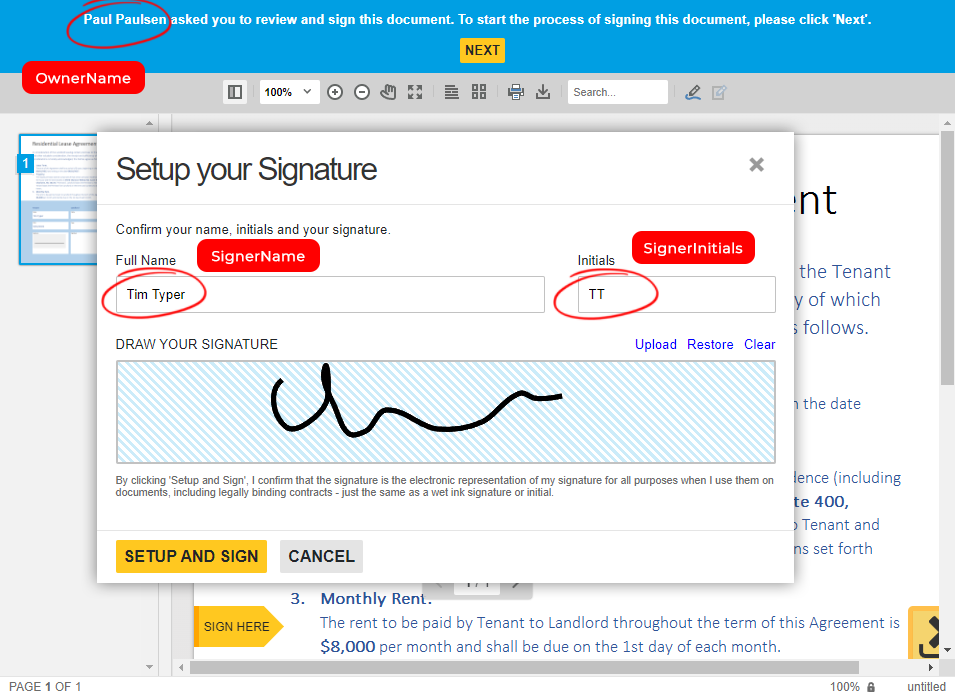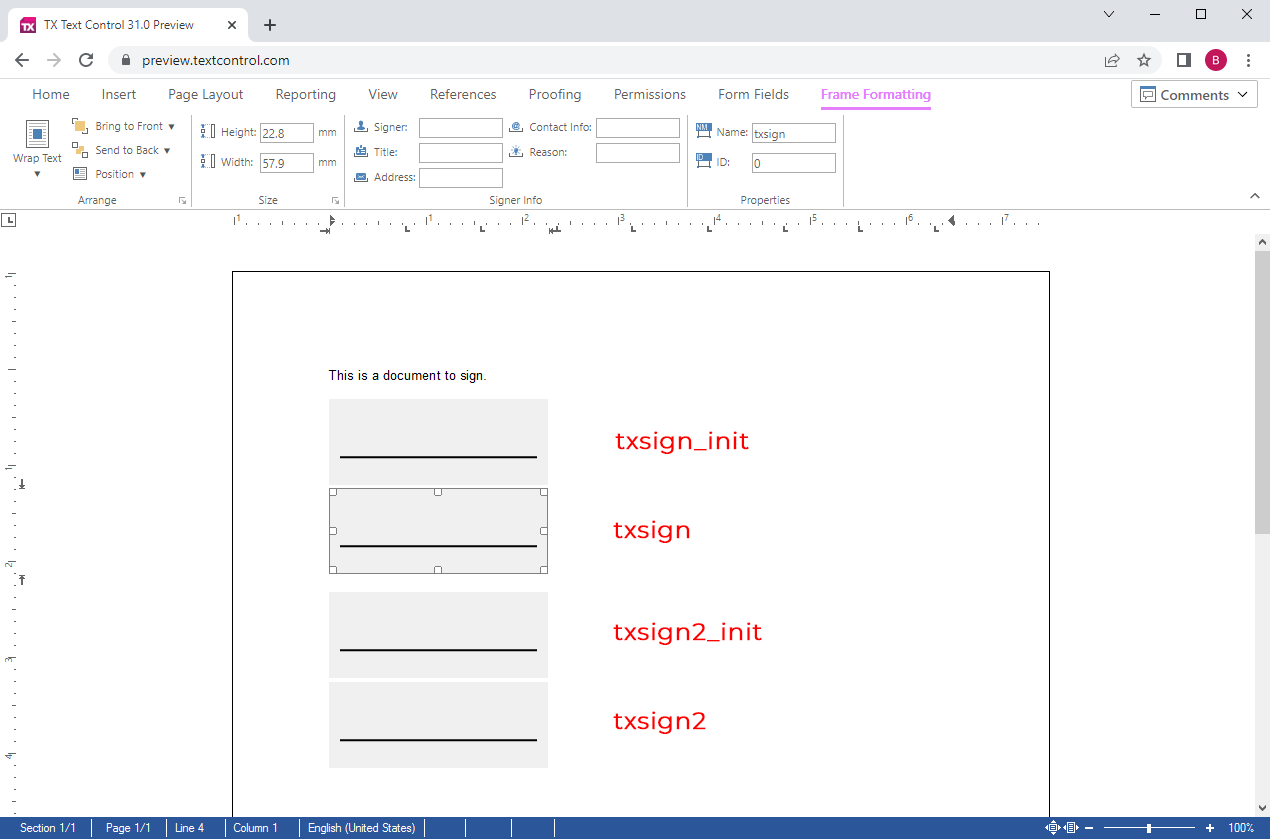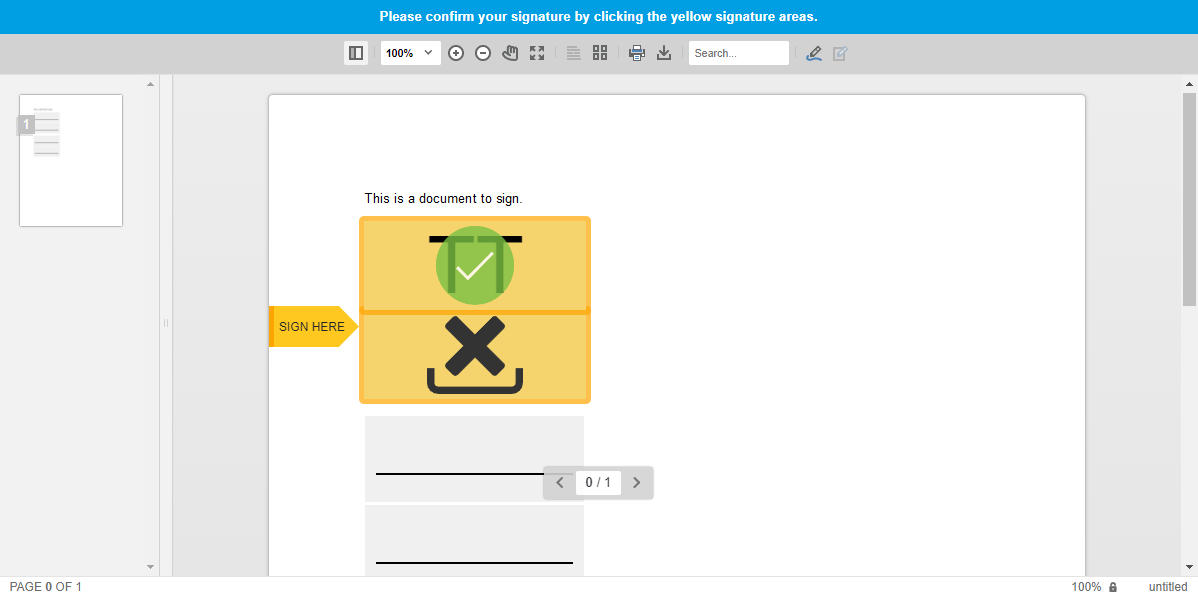When preparing the document viewer to acquire signatures from users, the Signature
╰ Web.MVC.DocumentViewer Namespace
╰ DocumentViewerSettings Class
╰ SignatureSettings Property
Specifies Web.MVC.DocumentViewer.SignatureSettings for document signing processes. property must be set with an instance of a Signature
╰ Web.MVC.DocumentViewer Namespace
╰ SignatureSettings Class
The SignatureSettings class describes the settings that are required for a document signing process using the DocumentViewer. object.
SignatureSettings Object
The following table lists the used SignatureSettings in the above MVC Html helper code.
| Setting | Value description |
|---|---|
| ShowSignatureBar | Specifies whether to show the blue signature bar on opening the document. |
| OwnerName | The name of the signature requester that is displayed in the signature bar. |
| SignerName | The name of the signer that is displayed in the "Setup your Signature" dialog. |
| SignerInitials | The initials of the signer that is displayed in the "Setup your Signature" dialog. |
| UniqueId | A unique ID that is included in the graphical representation of the electronic signature. |
| RedirectUrlAfterSignature | An Url that provides an endpoint to accept the signed document and signature data. |
| SignatureBoxes | An array of SignatureBoxes to define which signature fields should be used based on the given name. Additionally, the style of the signature box can be provided. |
Consider the following HTML Helper code that is adding a document viewer instance to an MVC Razor page:
| @Html.TXTextControl().DocumentViewer(settings => { | |
| settings.DocumentPath = Server.MapPath("~/App_Data/signature.tx"); | |
| settings.Dock = DocumentViewerSettings.DockStyle.Fill; | |
| settings.IsSelectionActivated = false; | |
| settings.ShowThumbnailPane = true; | |
| settings.SignatureSettings = new SignatureSettings() { | |
| ShowSignatureBar = true, | |
| OwnerName = "Paul Paulsen", | |
| SignerName = "Tim Typer", | |
| SignerInitials = "TT", | |
| SignatureBoxes = new SignatureBox[] { | |
| new SignatureBox("txsign") { | |
| SigningRequired = true, Style = SignatureBox.SignatureBoxStyle.Signature }, | |
| new SignatureBox("txsign_init") { | |
| SigningRequired = true, Style = SignatureBox.SignatureBoxStyle.Initials }} | |
| }; | |
| }).Render() |
Signer Information
The following screenshot shows the specified values in the document viewer:

Additionally, in the above code, the Signature
╰ Web.MVC.DocumentViewer Namespace
╰ SignatureSettings Class
╰ SignatureBoxes Property
Specifies a collection of signature boxes. property is defined with an array of Signature
╰ Web.MVC.DocumentViewer Namespace
╰ SignatureBox Class
The SignatureBox class represents the shown signature box in the UI. objects.
| Property | Description |
|---|---|
| ID | Specifies the identifier of the signature box. |
| Name | Specifies the name of the signature box. |
| SigningRequired | Specifies whether the signing is required. |
| Style | Specifies how the box is styled. |
Activate Signature Fields
When taking a look again at the code, two signature boxes are activated: txsign and txsign_init. txsign is defined as a signature box to acquire a signature and txsign_init is initialized as an initials box. Both fields are defined as a required field during the signature process.
| SignatureBoxes = new SignatureBox[] { | |
| new SignatureBox("txsign") { | |
| SigningRequired = true, Style = SignatureBox.SignatureBoxStyle.Signature }, | |
| new SignatureBox("txsign_init") { | |
| SigningRequired = true, Style = SignatureBox.SignatureBoxStyle.Initials }} |
Now consider the following template with 4 signature fields. The first two fields have the names that match the signature boxes in the above code. The other two fields have different names.

When initializing the document viewer, the first two defined signature fields are activated to request signatures.

Why is that useful? Consider a document that should be signed by 2 or more different parties. If the document is deployed to signer A, only those signature boxes are activated to acquire the visual signature representation.






